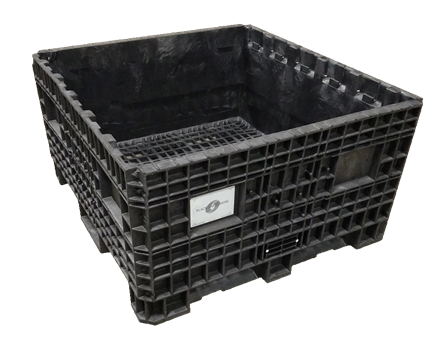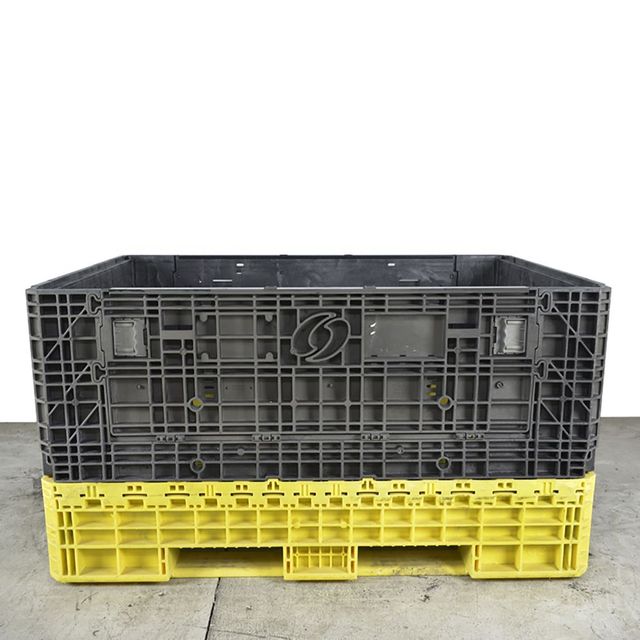Discover how industries save costs with refurbished bulk containers for everyday use
Wiki Article
The Ultimate Guide to Picking the Right Bulk Containers for Your Service Requirements
Picking the suitable bulk containers is important for any business that depends on efficient logistics. Different sorts of containers exist, each developed for certain materials and applications. Elements such as dimension, material compatibility, and regulatory standards play a significant role in this decision-making procedure. Understanding these aspects can cause improved operational performance. Numerous companies forget essential elements that could improve their overall efficiency and sustainability. What are these considerations?Comprehending Different Sorts Of Bulk Containers
Mass containers act as necessary tools for organizations seeking efficient storage space and transportation solutions. These containers are available in numerous kinds, each made to fulfill specific operational needs. One typical type is the intermediate bulk container (IBC), which is ideal for liquid and granulated products, supplying an equilibrium of ability and ability to move. An additional preferred alternative is the mass bag, or FIBC, ideal for completely dry, flowable items. These adaptable containers are light-weight and can be quickly transported and stored. For heavier materials, rigid mass containers are commonly utilized, offering toughness and security for risk-free handling. Additionally, there are specialized containers tailored for unsafe products, guaranteeing compliance with safety laws. Recognizing the distinctive attributes of these bulk container kinds enables businesses to make educated choices that maximize logistics and minimize costs. By picking the ideal container, business can enhance their functional performance and improve their supply chain processes.Trick Material Factors To Consider for Bulk Containers
When selecting mass containers, it is important to contemplate the products used in their construction. Variables such as stamina, chemical, and resilience compatibility play a critical role in ensuring the containers fulfill specific operational requirements. In addition, weight and transportability problems can influence both performance and transport logistics.Product Resilience and Toughness
Toughness and toughness are essential factors in choosing materials for mass containers, as they directly influence the container's capacity to withstand various environmental problems and handling processes. Materials such as high-density polyethylene (HDPE), polypropylene, and stainless-steel are commonly favored for their robust residential or commercial properties, using resistance to temperature level, influence, and abrasion variations. The choice of material also impacts the general life expectancy of the container; more powerful products generally lead to less frequent replacements, causing cost financial savings in time. Additionally, the weight of the product can impact shipping expenses and ease of handling. Businesses must consider their details functional environments and the capacity for deterioration to guarantee peak toughness and strength in their mass container option.Chemical Compatibility Aspects
Recognizing chemical compatibility is important for selecting mass containers, as the products utilized should withstand the particular substances they will certainly hold. Numerous aspects influence compatibility, including the chemical nature of the contents, temperature level, and period of storage. As an example, harsh chemicals may require containers made from stainless-steel or specialized plastics that stand up to destruction. In addition, responsive compounds can create warmth or gases, requiring vented or pressure-rated containers. The selection of container product, whether polycarbonate, metal, or polyethylene, need to line up with the chemical properties of the stored substances to stop violations or leaks. Inevitably, a detailed examination of these compatibility factors ensures safe handling and storage, shielding both personnel and the atmosphere while keeping product stability.Weight and Portability Worries
Picking bulk containers includes not just examining chemical compatibility but likewise taking into consideration weight and portability. Services have to evaluate the simplicity of handling and transportation to enhance performance. Lightweight materials like high-density polyethylene (HDPE) or light weight aluminum can help with easier motion and reduce shipping prices. On the other hand, larger containers may supply enhanced resilience however can hinder wheelchair, specifically in environments needing constant moving. Additionally, the style of the container must permit for hassle-free training and piling, guaranteeing ergonomic security for workers. Business must additionally consider the infrastructure available for transport; as an example, containers compatible with forklifts or pallet jacks can simplify procedures. Eventually, the ideal equilibrium in between weight and transportability straight affects functional effectiveness and cost efficiency.Sizing Your Bulk Containers for Optimal Efficiency
When sizing bulk containers, companies need to meticulously assess the dimensions required to accommodate their specific products. Additionally, weight capacity is an essential aspect that affects effectiveness and safety during transport and storage. Effective sizing not just optimizes area but additionally enhances functional workflows.Determining Container Capacities
Selecting the right measurements for bulk containers is important for taking full advantage of efficiency in storage space and transportation. Companies must examine their particular needs, taking into consideration factors such as readily available area, the nature of the items being stored, and the methods of transportation used. Accurate dimensions ensure that containers fit ideally in automobiles and stockrooms, decreasing wasted space and reducing taking care of time. Requirement dimensions can used collapsible bulk containers offer ease, yet customized dimensions could be required for one-of-a-kind demands or to suit specific products. Furthermore, it is essential to assess stacking capacities and ease of access, as these variables influence overall functional performance. Ultimately, the ideal measurements lead to enhanced company and structured logistics, profiting the overall performance of business.Weight Capability Considerations
Recognizing weight ability is important for services intending to maximize their mass container performance. The weight ability of a container directly impacts storage abilities, transport logistics, and general functional expenses. Choosing containers with the proper weight restrictions assures that businesses can safely store and deliver their products without running the risk of damages or compliance problems. Overwhelming containers can cause structural failures, while underutilizing capacity results in wasted sources. It is essential for services to examine their product weights and think about any type of regulative demands when selecting containers. Furthermore, aspects such as the sort of product, meant use, and environmental problems ought to also influence weight ability choices. By reviewing these aspects, services can enhance efficiency and assure a structured supply chain.Regulative Conformity and Safety Requirements

Regulative conformity and safety requirements play a vital duty in the selection of mass containers for organizations. Organizations needs to assure that their containers meet different laws set by neighborhood, national, and worldwide authorities. These criteria frequently relate to product safety, structural stability, and correct labeling, which aid avoid mishaps and assure the secure transport of products.
Furthermore, adherence to industry-specific standards, such as those from the Fda (FDA) or the Occupational Security and Health And Wellness Management (OSHA), is crucial for business managing harmful products or food. Non-compliance can lead to penalties, lawful issues, or damage to a company's online reputation.
Businesses must also consider the container's compatibility with the materials being stored or transferred to prevent contamination or chain reaction (used plastic containers). To sum up, recognizing and applying governing conformity and security requirements is vital for the efficient and accountable usage of mass containers
Sustainability Alternatives for Eco-Friendly Mass Containers

Companies are likewise exploring options made from recycled materials, which not only conserve sources yet additionally sustain the reusing industry. Technologies in layout permit for lighter containers that need less energy to transportation, better boosting sustainability. By incorporating these eco-friendly mass container choices, services can demonstrate their dedication to ecological stewardship while satisfying consumer need for lasting methods. This change not just aids the world but can also boost brand name track record and client commitment.
Cost-Effectiveness and Budgeting for Bulk Containers
While many businesses focus on sustainability, cost-effectiveness stays an important element when picking bulk containers. Organizations has to examine the initial acquisition price, along with long-lasting functional costs, to assure monetary viability. Variables such as resilience, upkeep, and reusability play a substantial function in figuring out overall expenses.Purchasing high-grade containers may yield higher upfront costs yet can cause financial savings via minimized replacement rates and reduced waste. Additionally, organizations ought to take into consideration transportation expenses and storage space performance, as these can impact the general spending plan.

Frequently Asked Questions
Exactly how Do I Figure Out the Right Container for Hazardous Materials?
To determine the ideal container for hazardous products, one should evaluate compatibility with the material, consider the container's product, check for regulatory compliance, and analyze ability and security attributes to assure proper handling and storage.Can Mass Containers Be Personalized for Certain Products?
Yes, bulk containers can be personalized for particular products. used plastic containers. Different features, such as product, size, and layout, can be tailored to fulfill distinct requirements, ensuring perfect safety and security and efficiency for carrying and keeping various productsWhat Is the Average Lifespan of Different Mass Container Kind?
The typical lifespan of bulk container kinds varies; plastic containers last 5-10 years, metal containers 10-20 years, and wood containers generally last 3-7 years, depending on use, maintenance, and environmental problems.Just how Should I Tidy and Maintain Bulk Containers?
To clean up and maintain bulk containers, one ought to on a regular basis inspect for damages, get rid of deposit, clean with appropriate detergents, wash completely, and guarantee correct drying prior to storage. Complying with maker guidelines boosts long life and safety and security throughout usage.Are There Rental Alternatives for Mass Containers Available?
Yes, various firms offer rental alternatives for bulk containers, offering adaptability for businesses. These services can fit various requirements, allowing companies to take care of supply successfully without the commitment of purchasing containers outright.Longevity and toughness are crucial variables in selecting materials for bulk containers, as they straight affect the container's capability to hold up against different environmental conditions and handling processes. Recognizing chemical compatibility is important for selecting bulk containers, as the products used have to withstand the specific compounds they will certainly hold. Recognizing weight capability is important for services intending to maximize their mass container performance. Regulatory conformity and security requirements play a necessary function in the choice of mass containers for businesses. While several businesses concentrate on sustainability, cost-effectiveness continues to be an important variable when picking bulk containers.
Report this wiki page